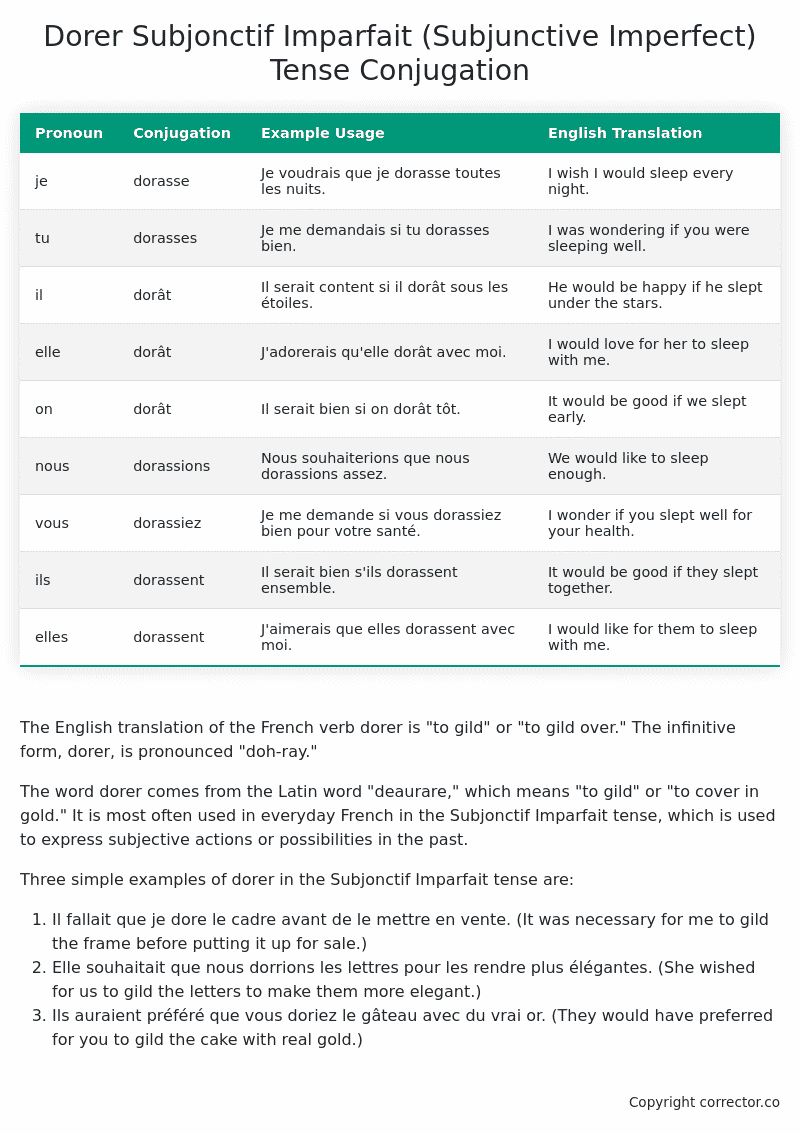Subjonctif Imparfait (Subjunctive Imperfect) Tense Conjugation of the French Verb dorer
Introduction to the verb dorer
The English translation of the French verb dorer is “to gild” or “to gild over.” The infinitive form, dorer, is pronounced “doh-ray.”
The word dorer comes from the Latin word “deaurare,” which means “to gild” or “to cover in gold.” It is most often used in everyday French in the Subjonctif Imparfait tense, which is used to express subjective actions or possibilities in the past.
Three simple examples of dorer in the Subjonctif Imparfait tense are:
- Il fallait que je dore le cadre avant de le mettre en vente. (It was necessary for me to gild the frame before putting it up for sale.)
- Elle souhaitait que nous dorrions les lettres pour les rendre plus élégantes. (She wished for us to gild the letters to make them more elegant.)
- Ils auraient préféré que vous doriez le gâteau avec du vrai or. (They would have preferred for you to gild the cake with real gold.)
Table of the Subjonctif Imparfait (Subjunctive Imperfect) Tense Conjugation of dorer
| Pronoun | Conjugation | Example Usage | English Translation |
|---|---|---|---|
| je | dorasse | Je voudrais que je dorasse toutes les nuits. | I wish I would sleep every night. |
| tu | dorasses | Je me demandais si tu dorasses bien. | I was wondering if you were sleeping well. |
| il | dorât | Il serait content si il dorât sous les étoiles. | He would be happy if he slept under the stars. |
| elle | dorât | J’adorerais qu’elle dorât avec moi. | I would love for her to sleep with me. |
| on | dorât | Il serait bien si on dorât tôt. | It would be good if we slept early. |
| nous | dorassions | Nous souhaiterions que nous dorassions assez. | We would like to sleep enough. |
| vous | dorassiez | Je me demande si vous dorassiez bien pour votre santé. | I wonder if you slept well for your health. |
| ils | dorassent | Il serait bien s’ils dorassent ensemble. | It would be good if they slept together. |
| elles | dorassent | J’aimerais que elles dorassent avec moi. | I would like for them to sleep with me. |
Other Conjugations for Dorer.
Le Present (Present Tense) Conjugation of the French Verb dorer
Imparfait (Imperfect) Tense Conjugation of the French Verb dorer
Passé Simple (Simple Past) Tense Conjugation of the French Verb dorer
Passé Composé (Present Perfect) Tense Conjugation of the French Verb dorer
Futur Simple (Simple Future) Tense Conjugation of the French Verb dorer
Futur Proche (Near Future) Tense Conjugation of the French Verb dorer
Plus-que-parfait (Pluperfect) Tense Conjugation of the French Verb dorer
Passé Antérieur (Past Anterior) Tense Conjugation of the French Verb dorer
Futur Antérieur (Future Anterior) Tense Conjugation of the French Verb dorer
Subjonctif Présent (Subjunctive Present) Tense Conjugation of the French Verb dorer
Subjonctif Passé (Subjunctive Past) Tense Conjugation of the French Verb dorer
Subjonctif Imparfait (Subjunctive Imperfect) Tense Conjugation of the French Verb dorer (this article)
Subjonctif Plus-que-parfait (Subjunctive Pluperfect) Tense Conjugation of the French Verb dorer
Conditionnel Présent (Conditional Present) Tense Conjugation of the French Verb dorer
Conditionnel Passé (Conditional Past) Tense Conjugation of the French Verb dorer
L’impératif Présent (Imperative Present) Tense Conjugation of the French Verb dorer
L’infinitif Présent (Infinitive Present) Tense Conjugation of the French Verb dorer
Struggling with French verbs or the language in general? Why not use our free French Grammar Checker – no registration required!
Get a FREE Download Study Sheet of this Conjugation 🔥
Simply right click the image below, click “save image” and get your free reference for the dorer Subjonctif Imparfait tense conjugation!

Dorer – About the French Subjonctif Imparfait (Subjunctive Imperfect) Tense
Formation
Common Everyday Usage Patterns
Interactions with Other Tenses
Subjonctif Présent
Indicatif Passé Composé
Conditional
Conditional Perfect
Summary
I hope you enjoyed this article on the verb dorer. Still in a learning mood? Check out another TOTALLY random French verb conjugation!


